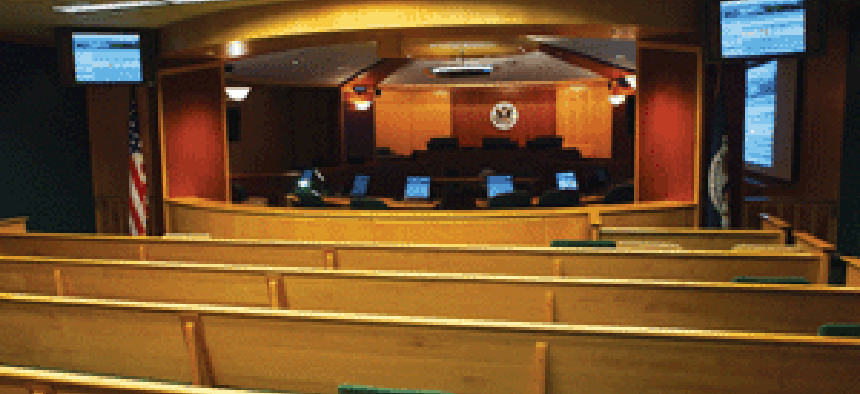Yucca Mountain battle will be fought in digital court

To manage data from the Energy Department's license application for a commercial nuclear-reactor waste-storage facility at Nevada's Yucca Mountain, the Nuclear Regulatory Commission has built digital courtrooms for the agency's Atomic Safety and Licensing Board Panel.
Deep bookshelves curve behind the lawyers' tables in a courtroom at the Nuclear Regulatory Commission in Rockville, Md. Crammed onto the shelves are thousands of paper documents generated over the course of complex hearings before the commission. They contain the details of proposals such as licensing a new reactor and building a waste repository.The mounds of paper were expected to grow significantly over the next few years, as adjudication moved forward on the Energy Department's license application for a commercial nuclear-reactor waste-storage facility at Nevada's Yucca Mountain.The proceeding, which Congress mandated to last three to four years, likely will be one of the largest and most complex administrative hearings in U.S. history, NRC officials said.To better manage data that would derive from the Yucca hearings as well as the commission's regular proceedings, NRC officials built two digital courtrooms for the agency's Atomic Safety and Licensing Board Panel."Our hearings typically have three judges and three or more parties," said Andrew Welkie, Digital Data Management System project manger for NRC. "The documentation was printed for each case and all participants: attorneys, witnesses, NRC staff. It was stacks and stacks of paper."Nortel Government Solutions Inc. of Fairfax, Va., was the prime contractor and systems integrator for the project. ExhibitOne Corp. and Media Edge Inc. supplied hardware, software and integration services.Media Edge, Linthicum, Md., focused on Internet multimedia solutions, and ExhibitOne of Phoenix provided audiovisual technologies.The NRC's cases generally are complex and require that administrative law judges, NRC staff and other participants have quick access to volumes of documents.Most cases involve those seeking licenses and those, such as environmental groups and localities, opposing the granting of those licenses.The new digital courtrooms in Rockville and Las Vegas eliminate the headaches of dealing with paper records by providing electronic evidence presentation, digital audio and video transcripts, and electronic capture and display of evidence."The digital data management system was designed and developed to handle the Yucca Mountain proceeding," Welkie said. "The Department of Energy wants to build a waste facility there, and we have this three- to four-year congressional mandate to issue a decision."The Yucca hearings are expected to generate 50,000 documents.Everything introduced in the hearing room, whether computer-based, audio, video or physical, is recorded electronically and goes to a set of servers. Because the hearing room is digital, people off-site can submit documents over the Web or testify via videoconference.A key aspect of the system is its fully searchable audio and visual transcripts. As a hearing is being transcribed, the transcription is married to the video to enable searches to find a specific point in the recording.The system's Web interface displays the transcript in one window and next to it in another window, the corresponding video. The set-up makes it easy to scan the transcript and find a specific spot to start running the corresponding video."What makes this system unique is it has taken known technologies and integrated them into one system," Welkie said. "If you walk into a federal courthouse, you're going to see video monitors, cameras, microphones and computers. And we have the database, which is also out there in courthouses. But making that database available in the hearing room is something a little different than other courts are doing."The system is built on Plumtree's portal technology, which integrates all the other technology, said Paul Gwaltney, digital data management system program manager for Nortel Government Solutions. Plumtree is now part of BEA Systems Inc. of San Jose, Calif."We used the portal and created custom code to handle a lot of the hearing functions within the hearing room, such as witness management, document management and other things," Gwaltney said.All authorized participants get a user name and password and can log into the system from anywhere with an Internet connection.In the courtroom, each seat has a workstation. Because all documents and evidence are filed before the hearing, from the moment the hearing begins, the judge as well as the participants can simultaneously pull up any document, annotate it and reintroduce it as a new piece of evidence."For example, if an expert witness draws arrows on a map, that can be re-entered as evidence," Gwaltney said.The licensing board panel's chief administrative law judge since 1999, G. PaulBollwerk has been with the agency since 1989. While the NRC has been successful in moving cases through its system, slow, antiquated methods are still in use, hesaid."We have someone stamping all the paper documents to put them into the record," Bollwerk said."With this system, we can do all that electronically and save a lot of time. It may not seem like it, but we can probably save 15 percent to 25 percent of that time doing it electronically."


New digital courtrooms in Rockville, Md., seen here, and Las Vegas eliminate the headaches of dealing with paper records by providing electronic evidence presentation, digital audio and video transcripts, and electronic capture and display of evidence.
Rick Steele
NEXT STORY: The news in brief